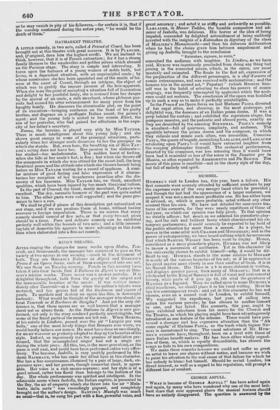HAYMARKET THEATRE.
A LITTLE comedy, in two acts, called A Friend at Court, has been brought out at this theatre with great success. It is by PLANCHE,
and, if original, does him the highest credit. We are inclined to
think, however, that it is of French extraction; for it has a strong family likeness to the vaudevilles and petites pieces which abound
on the Parisian stage. The story is simple and interesting. It
turns upon the fortunes of a young woman of noble birth, but living, in a dependent situation, with an unprincipled uncle ; by
whose connivance she has been appointed one of the maids of ho- nour at the court of Cassel, through an intrigue, the object of which was to gratify the impure passion of the heir-apparent. When she is on the point of accepting a situation full of fascination and delight to her youthful fancy, she is resbued from her danger by the arrival of an uncle, a rich Merchant, whose plebeian pur- suits had caused his utter estrangement for many years from his haughty family. He discovers the abominable plot, on the point of its execution—bringing confusion on the head of his guilty
brother, and disgrace on a profligate Italian count, the prince's agent: and the young :lady is united to her cousin Ebert, the son of her protector, who had gained her affections in the capa- city of her father's secretary. Emma, the heroine, is played very ably by Miss TAYLOR. There is much intelligence about this young lady ; and she
shows great energy in some of the, principal situations, parti-
cularly when her stranger uncle discovers to her the precipice on which she stands. But, even here, the besetting sin of Miss TAY- LOR'S acting does not leave her. Her passion IS 1.00 elaborate—
too studied—too melodramatic. The sudden burst of feeling, when she falls at her uncle's feet, is fine but when she throws off
the ornaments in which she was attired for the court-ball, the long theatrical pause and the attitude into which she throws herself bring before us Miss TAYLOR waiting for a round of applause. A simi- lar mixture of good feeling and false expression of it charac-
terizes her reception of her treacherous guardian after the dis-
covery of his baseness. Miss TAYLOR has, we think, excellent qualities, which have been injured by too much theatrical tuition. In the part of Conrad, the blunt, manly merchant, FARREN was excellent. The dry, sarcastic humour of the part was quite suited
to him. The other parts were well supported ; and the piece pro- mises to have a run.
We shall be glad if pieces of this description get naturalized on our stage, and if we can produce them at home, without having
recourse to foreign importation. There is no reason that every comedy should consist of five acts, or that every two-act piece should be a Live. Pure and delicate comedy can be exhibited perfectly well within the bounds of two acts ; and a little interest- ing tale of domestic life appears to more advantage in this form than when elaborated into a five-act comedy.


























 Previous page
Previous page